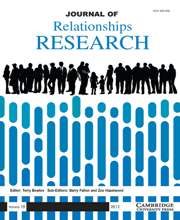Article contents
The Better Part of Valor: Developing a System for Studying How Couples Transition Out of Untimely Conflict Conversations
Published online by Cambridge University Press: 01 September 2015
Abstract
This study employed a novel methodological design to explore how couples transition out of a disagreement that they do not have time to resolve. Thirty college-aged dating couples participated in a 20-minute interaction with their partner where they were required to transition from a conflict conversation to the story of how they met, in a time-limited paradigm. Independent coders coded transition styles and couples completed self-report measures of relationship satisfaction pre, post, and at 6-month follow-up. We identified four transition styles: Mutual Avoidant, Mutual Collaborative, Abrupt/Controlling, and Resign/Withdraw. Couples with a Resign/Withdraw style deteriorated over time compared to couples with the other three styles. Further, couples also varied in terms of transition qualities, including how easily they disengaged and how deeply meaningful the conversation was. Ease of transition was associated with increases in relationship satisfaction at 6 months, whereas depth was associated with decreases in relationship satisfaction both immediately after the interaction and at 6 months. Implications are discussed.
- Type
- Research Article
- Information
- Copyright
- Copyright © The Author(s) 2015
References
- 4
- Cited by


